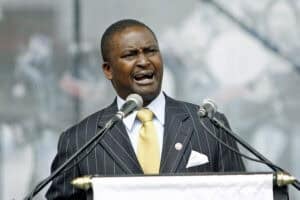Joseph Muscat and one of his ex-ministers have been charged with accepting bribes, corruption in public office and money laundering.

Former Maltese premier Joseph Muscat, the current deputy premier and the central bank chief are among dozens of people and companies charged in a hospital privatisation scandal rocking the Mediterranean island nation.
Muscat and one of his ex-ministers, Konrad Mizzi, have been charged with accepting bribes, corruption in public office and money laundering, according to documents obtained by AFP late Tuesday.
ALSO READ: Dodgy connections: Eskom has lost over R203bn to corruption since 2018
It is the first time a former premier will face criminal charges in court. Muscat strongly denies the allegations.
Deputy Prime Minister Chris Fearne — previously tipped to be Malta’s next European Commissioner — and former finance minister Edward Scicluna, governor of the Central Bank of Malta, were also charged with fraud, misappropriation and fraudulent gain.
Muscat’s former chief of staff Keith Schembri has been charged with money laundering, soliciting bribes and abuse of office to exact an unlawful advantage “through threats or abuse of authority”.
The charges were filed on Monday after a long-running investigation that has shaken Malta’s political establishment.
It dates back to the decision by Muscat’s Labour government in 2015 to pass management of three public hospitals to a private company, Vitals Global Healthcare.
The company had no healthcare experience and after 21 months it sold the concession to another company, Steward Health Care, without having made any of the investments it had promised.
Following a challenge by the opposition Nationalist party, a court last year annulled the privatisation deal, finding evidence of fraudulent behaviour.
An appeal court upheld the ruling and also found there had been “collusion” between the companies and senior government officials.
– ‘Lies… fantasies’ –
Following a request by civil society group Repubblika, a separate criminal investigation was launched in 2019 which recommended last month that charges be brought.
Those charged are expected to be summoned to court in coming days, beginning what is likely to be a long legal case.
Those accused of money laundering risk jail sentences of up to 18 years.
Muscat — who resigned in 2019 in the political fallout over the murder of journalist Daphne Caruana Galizia — has strongly protested his innocence.
“If they weren’t so serious, the accusations against me would be laughable,” he wrote on his Facebook page on Tuesday.
“Without even questioning me, the authorities decided to smear me and accuse me of corruption, money laundering, establishing a criminal organisation, and even claiming I took 30 million euros.”
ALSO READ: Senior Eskom technician arrested for fraud and corruption
He added: “It will be my pleasure to dismantle each of these accusations and show how they are not built just on fantasies, but also on lies.”
Fearne has also protested his innocence.
Prime Minister Robert Abela — who succeeded Muscat as Labour Party leader — has questioned the timing of the conclusion of the inquiry, ahead of European Parliament elections in June.
Abela raised doubts over the magistrate’s investigation at a press conference Monday when he accused some journalists of being part of an “establishment” seeking to damage Labour and destabilise the country.
– Judicial independence –
Civil society organisations and the opposition condemned his statements.
Muscat “chose to stand alongside the aggressor instead of the victims… he chose his colleagues instead of Malta and the Maltese,” Nationalist Party leader Bernard Grech said.
Repubblika added: “The prime minister’s conduct amounts to a gross assault on judicial independence and the rule of law. We will resist this attack.”
ALSO READ: Nepotism charge at ‘SAA 2.0’ as staff apparently filched from Airlink
Muscat resigned as prime minister after investigations into the October 2017 murder of Caruana Galizia implicated members of his office.
The car bomb attack against the journalist, who had exposed cronyism and sleaze within Malta’s political and business elite, sparked international outrage and protests across Malta.
A public inquiry published in 2021 found no evidence of state involvement in her assassination, but found the government created a “climate of impunity” for those who wanted to silence her.
© Agence France-Presse






